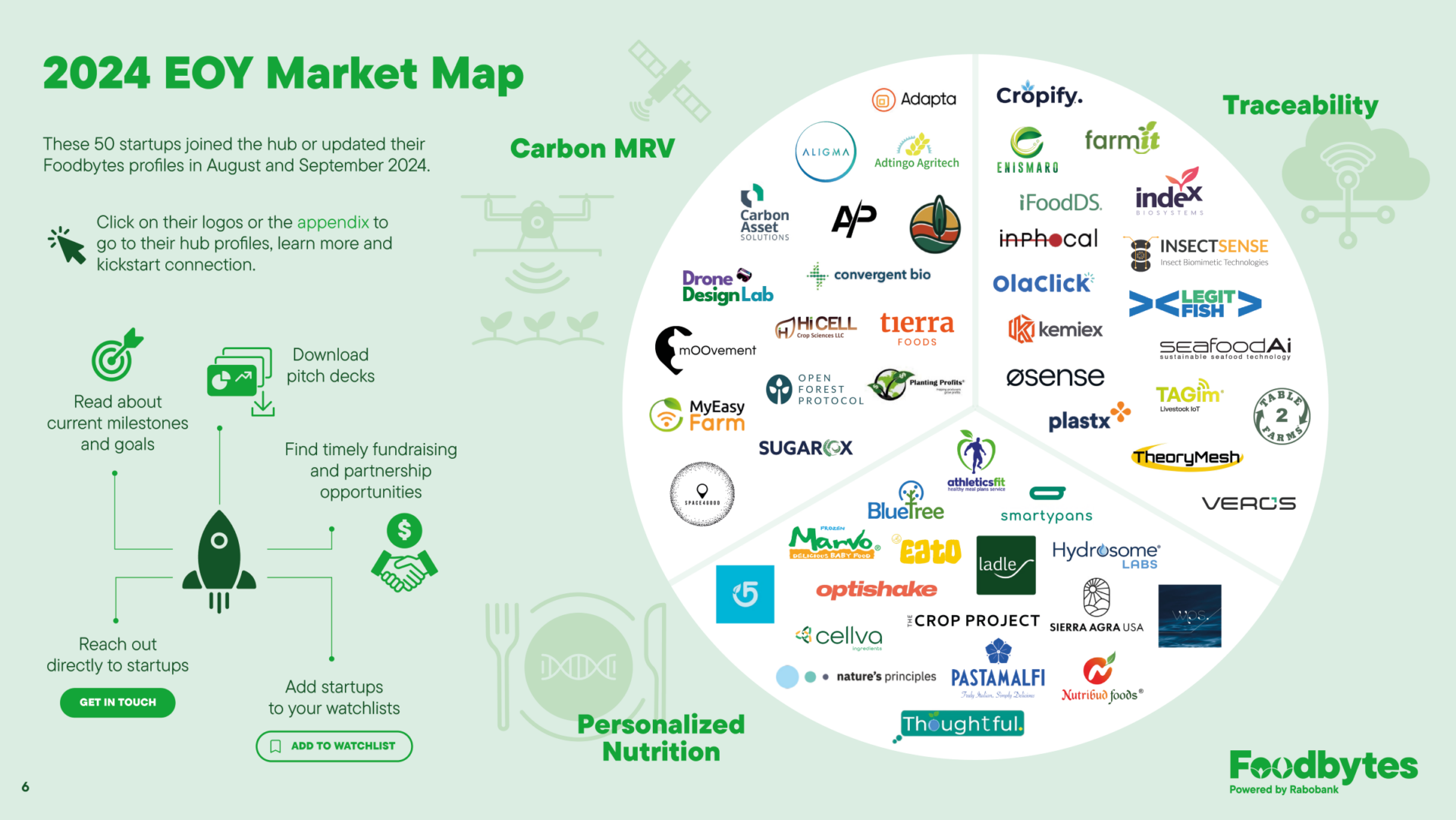
Partnering for the Food Transition: Aligning Incentives & Amplifying Impact
Disclaimer: The information contained in this post represents the views of the individual panelists and does not necessarily reflect the views of Foodbytes or Rabobank. The publication of this content by Rabobank is not an endorsement of any entity affiliated with the panelists or a recommendation to do business with the entities involved.
Foodbytes hosts bimonthly, exclusive virtual roundtables featuring a panel of experts across the food and ag industry and within Rabobank, with upwards of 100 global corporates, investors and startup founders attending, and the latest roundtable discussed partnering for the food transition. Want to get invited to our next roundtable? Take 5 minutes to create your Foodbytes profile.
On October 9, our roundtable session explored how the food transition and sustainability overlap, the food industry impacts of one investor’s midstream technology portfolio and and how an alt-protein startup intends to innovate core business for large manufacturers. The conversation featured Rabobank North America Chief Sustainability Officer Terryn Lawrence, Tilia Holdings Managing Director Rob Celin, Mozza Foods CEO & Founder Adam Tarshis, Foodbytes Data Intelligence AVP Sonia Shekar and Foodbytes Partnerships Director Caroline Keeley.
October’s roundtable comes fresh off the tailwinds of NYC Climate Week, where the Foodbytes team attended panels and fireside chats with industry leading corporate players, impactful investors and pioneering startups. The week’s events and voices highlighted the multifaceted approach needed to support a transition towards sustainable food systems – with regenerative agriculture in particular requiring the involvement of financial innovation, policy support, community engagement and of course, startup innovation.
Top-of-mind challenges included engaging financial institutions in regenerative practices, coordinating policy standards and public-private partnerships, centering producers and involving farmers in solutions earlier, and harmonizing dynamic data for transparency, solution implementation and impact realization. This roundtable panel referenced some of these challenges and provided unique insights on the approaches and responsibilities of food and agriculture leaders in building tomorrow’s sustainable food system.
Financing the Food Transition
with Terryn Lawrence, Rabobank North America Chief Sustainability Officer
Rabobank’s sustainability team defines the food system transition as a shift towards a sustainable system that ensures sufficient, healthy and affordable food for a growing global population while minimizing agriculture’s environmental impacts. This involves adopting sustainable agricultural practices, addressing food loss and waste, incorporating diversified protein and improving rural livelihoods. Terryn Lawrence noted the overlap with sustainability, focusing on efficiency to reduce nature and climate impacts. However, the “people” component of the food transition may conflict with sustainability, as improving producers’ living standards might prioritize economic growth over long-term environmental goals. Lawrence stressed the need for agility to balance sustainability’s various aspects cohesively and highlighted the importance of participating in supply chain discussions that bridge the entire ecosystem of a specific sector, including growers and producers.
Lawrence’s team, with a global footprint, observes different incentive structures to drive change. North America relies heavily on “carrots” like subsidies, grants, tax breaks and global market access, which help de-risk new technologies and investments. In contrast, Europe’s regulatory environment is more advanced. Mandatory reporting (“sticks”) has started to create transparency and change. Ultimately, both carrot and stick methods are necessary tools, however from an innovation perspective, carrot incentives provide a more direct opportunity to de-risk the financial outlay required to try new technologies.
“Increasingly, sustainability is becoming integral to all strategic discussions. It is no longer peripheral to the business. This is an exciting era, but it demands consistency, data transparency, and ongoing dialogue.”
– Terryn Lawrence, Rabobank North America Chief Sustainability Officer
Investing in Corporate Technology Adoption
with Rob Celin, Tilia Holdings Managing Director
Tilia’s investment strategy focuses on supporting the food industry’s transition to meet health needs by making control investments in middle-market business and industrial services companies within the midstream supply chain. They target high-potential assets providing critical services to the food industry, aiming to grow and transition these businesses to create value for investors. Tilia’s framework operates on two levels: thematic and operational. Thematically, portfolio companies must address food safety, nutrition and sustainability. Operationally, Tilia emphasizes sound business practices, efficient operations and safe workplaces.
Managing Director Rob Celin explained that Tilia partners with closely held, founder-family businesses, understanding their needs and integrating technology to enhance efficiency, food safety, regulatory compliance and sustainability. They avoid imposing technology top-down, instead seeking market solutions that align with the companies’ operations. Tilia looks to invest in companies that can provide infrastructure updates that will be required by large CPGs to meet the evolving needs of their customers. By investing in midstream companies, they address historical under-penetration by private investment and enable its critical role in responding to changing consumer preferences. An example is their investment in a high-pressure processing provider in North America, which supports clean label products with unique food safety requirements.
From the perspective of a startup, Mozza Foods CEO Adam Tarshis echoed the importance of meeting potential customers, like dairy companies, where they are. Mozza modifies its production processes to integrate seamlessly into existing workflows, minimizing impact on the supply chain. This approach ensures that sustainable alternatives can be adopted without significant infrastructure changes.
“Our portfolio companies work with 100% of the top 20 food and beverage brands in North America, so by focusing on midstream segments providing critical services to the food industry, we can really drive positive impact across the food system.”
– Rob Celin, Tilia Holdings Managing Director
Founder’s Perspective on Innovating Core Business
with Adam Tarshis, Mozza Foods CEO & Founder
Mozza Foods exemplifies a new strategic focus within the food industry—aligning R&D and product development with established, scalable processes in agricultural and protein extraction technologies. By engineering soybean genetics to express bovine casein, Mozza is pioneering a molecular farming approach that integrates seamlessly into existing pathways, from field growth to protein processing, making it possible to scale rapidly while aligning with market demands for cost-competitive alternatives to animal-derived proteins.
CEO Adam Tarshis emphasizes that molecular farming technology is not speculative but operational, with a number of companies in the space already in proof-of-concept trials, and larger trials planned over the next 12-24 months. With over 20 milk protein-producing plant lines in their greenhouses, Mozza is actively advancing expression levels to achieve cost parity with traditional dairy proteins and is working to provide samples to manufacturers next year. Tarshis highlights a shift in the industry’s expectations: while early optimism between 2018 and 2020 anticipated quick market entry for emerging technologies, recent years have clarified the complexities of evolving trillion-dollar industries and vast food supply chains. This reality has encouraged manufacturers to adopt more measured timelines, staying open to testing new formulations as they come available and gradually incorporating alternative proteins.
Tarshis also emphasizes that true transformation in the food system will come from a quiet, foundational shift in the ingredients behind familiar products. If the alternative protein sector achieves cost parity, a transition to sustainable foods will happen quietly and seamlessly, reshaping the food landscape with minimal disruption to consumer habits.
“The fact is that the real change is going to come from everyday products being powered by more sustainable ingredients.”
– Adam Tarshis, Mozza Foods CEO & Founder
